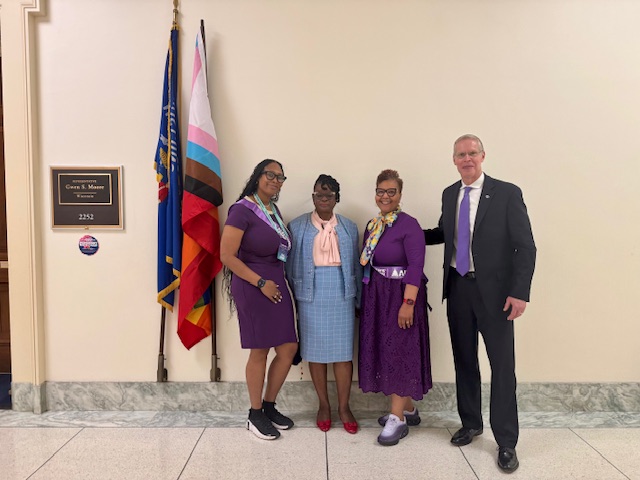Each month, we’re featuring an advocate who engages with policymakers to ensure priorities that improve the lives of people impacted by Alzheimer’s and all other dementia remain top-of-mind in Congress.
For Vinitia Strong-McDonald of Milwaukee, Wisconsin, advocacy is not a new role — it’s a decades-long mission. Whether through her career in community reinvestment or helping out in her neighborhood to bring people together, Vinitia has been a leader who stands up for her community. But when Alzheimer’s struck her family, she found a new cause fighting against this devastating disease.
Throughout her life, Vinitia saw several of her family members battle Alzheimer’s, starting with her grandmother. “At that time I really didn’t understand it,” said Vinitia. “But then my dad’s sister got it, and she lived right around the corner from me. I became involved with her caregiving.”
Then Vinitia’s sister Darlene was diagnosed when she was just 59 years old. She was a salon owner, a vibrant and independent businesswoman. “My sister lived within a 10-minute walking distance from me,” said Vinitia. “Her hair salon was in the back of my house. It’s all community over here with us.”
When she began to become confused and wander around the neighborhood, Vinitia recognized that something was wrong. After her diagnosis, Vinitia became her primary caregiver.
“It’s just devastating seeing people go from being productive individuals to not even recognizing you anymore,” said Vinitia. “My sister started calling me mama. I never told her I wasn’t my mom. People say I look like my mother. I just rolled with it because I didn’t want to frustrate her, I just wanted to be there for her.”
Because of Vinitia’s own experiences and background, she was able to determine on her own what she needed to care for her sister. “I was able to research information to help me along my journey. But I thought, ‘What about people that don’t have access to computers, or they’re not computer savvy? They don’t have this. Let me get involved so I can be in the community and get the word out to educate on what’s available,’” said Vinitia. “So that’s why I’ve decided I’m all in. I’m going to turn my pain into passion.”
In 2023, Vinitia first became involved with the Alzheimer’s Association. Then a few months later, and only two weeks after Darlene’s passing in March 2024, Vinitia decided to travel to Washington, D.C., to attend the AIM Advocacy Forum. Carrying her sister’s obituary with her, Vinitia attended her first meetings on Capitol Hill.
With her sister’s passing so fresh, she was at first hesitant to attend. But when she went into her Capitol Hill meetings, she said, “This is how important it is for me to be here. I’m grieving, but this is a picture of my sister. I don’t want you to just know her name. I want you to know her face.”

It marked a turning point for Vinitia. At her first Advocacy Forum, she found a new community among her fellow advocates and a renewed sense of purpose.
“When I walked into that ballroom for the first time, I got the chills,” said Vinitia. “I felt the power, the energy, the impact. And I thought, ‘This is where I’m supposed to be.’”
Since then, Vinitia has become an Alzheimer’s Ambassador for Congresswoman Gwen Moore (WI-04) — someone who knows Vinitia’s family and neighborhood and has seen the impact of the disease on their community.
“Anytime I call her office, they’re very responsive and reactive,” said Vinitia. “I just think that’s a blessing.”
In addition to her advocacy work, Vinitia also serves on the Alzheimer’s Association’s Health Equity Coalition in Milwaukee, where she helps organize events that bring education, resources, and respite to those in her community.
“We’ve had the sheriff, the county executive, and other local leaders come speak,” said Vinitia. “We even provide respite rooms for caregivers. We’re planning a Pastor Summit to get churches involved — especially in the African American community. We want them to be able to identify if their members are [facing Alzheimer’s and other dementia] and know how to help.”
Having experienced firsthand the denial that often comes with a family member’s diagnosis, Vinitia is working to raise awareness about the stigma and misinformation surrounding dementia.
“People were in denial. They didn’t want to deal with it,” said Vinitia. “I think that’s where the education piece comes in. You don’t have it now, but educate yourself so if something happens, your family can advocate for you.”
With her sister, Vinitia also saw the importance of care providers having the training and skills to recognize the symptoms of dementia. When her sister was first being evaluated for Social Security, the doctor told Vinitia he believed her sister was lying. Vinitia knew her sister and knew that was not the case, so she took action to advocate for her sister. After filing a complaint and Darlene receiving another evaluation from a different doctor, Vinitia was told that her sister had Alzheimer’s.
“He came out, and he said, ‘Vinitia, I am so sorry about your first experience. Your sister has it. I really hate that you had to go through that,’” said Vinitia. “It was very difficult, a doctor thinking my sister was lying about her illness.”
Through it all, Vinitia remains a beacon of hope and determination.
“I’m just an ordinary person trying to do an extraordinary thing,” said Vinitia. “Everybody’s got a skill, a talent, a gift. You just have to learn how to use it. There’s a place for everyone — you’ve just got to follow your passion.”
Learn more about how you can follow your passion and become an advocate like Vinitia.